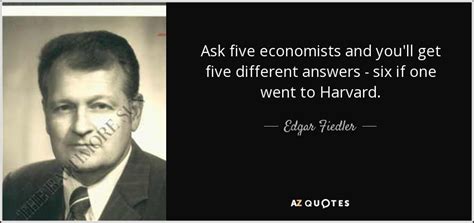A Quote by Malcolm Forbes
Anyone who says businessmen deal in facts, not fiction, has never read old five-year projections.
Related Quotes
I had never experienced anything like the response I got from people for Pirates of the Caribbean, where you meet a 75-year-old woman who had seen Pirates and somehow related to the character, and then five minutes later you meet a six-year-old who says, 'Oh, you're Captain Jack!' What a rush. What a gift. That was the challenge with Wonka, too--to be, in a sense, like Bugs Bunny. I find it magical that a three-year-old can be mesmerized by Bugs, but so can a 40-year-old or an 80-year-old. It's a great challenge to see if you can appeal to that huge an age range.
The artist is the lowest form of life on the rung of the ladder. The publishers are usually businessmen who deal with businessmen. They deal with promotional people. They deal with financial people. They deal with accountants. They deal with people who work on higher levels. They deal with tax people, but have absolutely no interest in artists, in individual artists, especially very young artists.
Steven Pinker says, the invention of printing and the widespread appearance of fiction -
this taught empathy. If you read a novel, you're in someone else's head, in three, five different people's heads. Suddenly, the principle of "Don't do anything to anyone that you wouldn't want done to you" becomes real in people's minds. That's a fantastic achievement if fiction is indeed partly responsible for it. That's a great thing to be a part of. In the end, then, I don't know if writers have legislated, but they have civilized.
And if I get a little chemically imbalanced in the head, like we all know I tend to get sometimes, and I don't want my parents or brother knowing, Will's like, 'We'll deal with it.' He's never said, 'I'll fix it up.' He just says, 'You're not up to going back to uni to finish your Honours this year? Big deal. There's next year. We'll deal with it.'" She nods. "That's what he does well.
Reading things that are relevant to the facts of your life is of limited value. The facts are, after all, only the facts, and the yearning passionate part of you will not be met there. That is why reading ourselves as a fiction as well as fact is so liberating. The wider we read the freer we become.




































